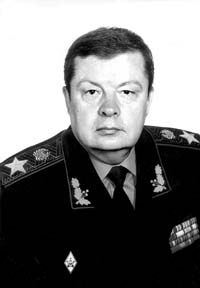The agenda of the Ukraine-NATO Commission Brussels session at the level of defense ministers was more modest than that of a similar meeting with Russia. The main point of discussion here was military reform in Ukraine, the progress of which is considered an indispensable condition for closer cooperation between NATO and Ukraine. This session was the first public appearance abroad of Ukrainian Minister of Defense Volodymyr Shkidchenko in his new post. It is an open secret that Gen. Shkidchenko projected a far better image in the West than did his predecessor. Little wonder, for the new Ukrainian minister spoke in English, which is still rare for the former USSR. Moreover, he cited concrete facts rather than mouthing hackneyed phrases about the progress of military reform.
Asked about the concrete solution to the technical standardization problem, whether Ukrainian military hardware meets NATO standards, and whether this will mean updating the existing or building new equipment, Gen. Shkidchenko said, “A Ukrainian Defense Ministry task force is completing its study of the military hardware standardization documentation furnished to Ukraine by the NATO leadership. Yet, I want to point out that new military equipment is already being manufactured in Ukraine that take NATO standards into account. For example, Kharkiv’s Malyshev defense plant is producing NATO-caliber 120-mm guns for the T-82 tank. Ukraine is also guided by NATO standards in tank production and its aeronautical industry.”
“As the Armed Forces reform unfolds in Ukraine, many servicemen will leave the army. What about their future level of social security?”
“Although the Ministry of Defense is addressing this problem, I remind you that there is a council chaired by Mr. Shykalov that directly deals with the social security of retired military personnel. This council was recently granted the status of a government organization.”
“Do you plan to use the experience of the Baltic states, Georgia, etc., and send more military cadets than conscript soldiers to Partnership for Peace
international exercises, for soldiers have nobody to share their experience with after demobilization?”
“No doubt, there is some sense in involving professional cadets in PfP exercises, and we are already doing this. For instance, during a recent joint exercise held in Britain, an air mobile company included some Odesa Ground Forces Institute cadets. So we are doing this.”
“Which branches of the service are subject to the most radical reduction in the course of military reform in Ukraine?”
“I would emphasize the word reform rather than reduction. All the four Armed Forces branches (the Air Force, Navy, Ground Forces, and Air Defense) are subject to this reform, but the program envisions the formation of a new branch based on the Air Force and Air Defense. So we can say that the reform will most affect these two branches.”







